
20 Feb Max Seeburg – History maker
Max Seeburg was born in Leipzeg in 1884, but moved to London when he was just two years old. His father ran a fur shop close to his home near Tower Bridge, and it wasn’t long before Seeburg was found kicking a ball around.
Despite being an apprentice carpenter, it was the game of football which piqued his interest best, and he soon got on with a playing career which would take him all over England. He played for ‘Park’ a Tottenham-based side, and also had a spell with an early incarnation of Cheshunt, before joining Chelsea, though he did not play a competitive game in West London.
Next up was a move to Tottenham Hotspur in May 1907, with whom he toured Belgium that summer. He scored a hat trick on the first game of the tour V Union Saint Gialloise.
Playing at either center or inside forward he managed seven goals in 24 games during the 1907-08, Southern League season, Spurs’ last before moving to the Football League. He only played once for Spurs in the Football League, but this awarded him the honour of being Spurs’ first overseas professional player, and the first European to play in the Football League.
For a while, Spurs fans had claimed he was the first foreign-born player (from any country) to play in the League, but that honour went to Canadian Walter Wells Bowman who turned out for Accrington Stanley. Seeburg could claim to be the first foreign-born professional though.
Seeburg couldn’t force his way into the Spurs team, so moved across London to sign for Leyton – then also playing as professionals but in the Southern League.
He made his debut for Leyton on 24 October, a 3-0 win over New Brompton (now Gillingham) in the Southern League; where his indroduction was deemed “an improvement” to Aylward at centre forward by The Sportsman. He scored his first goal a couple of weeks later in a 2-1 win over Brighton & Hove Albion in the Wester League and would score seven goals in 40-odd appearances that season.
After a season and a half of playing for Leyton, Seeburg left the bright lights of London, signing for Burnley, where he made 17 appearances, without scoring, perhaps understandably, given he was now playing at right half.
Midway through the season it was time for Seeburg to move east, signing for Grimsby, where he played 20 games.
Then it was time for another move, this time back down south to sign for Reading. Seemingly never going to make it as an out-and-out professional footballer, Seeburg retired from the game in 1913 to run a pub in Reading.
Towards the end of the First World War, raids on a series of addresses in Reading led to a number of German and Austrians being arrested. Max Seeburg was one and he was held in custody for a number of weeks.
He was taken to an internment camp for ‘enemy aliens’ at Newbury Racecourse, not far from his then home. At its peak, the camp held 3,000 men which were guarded by the National Reserve. The majority of the internees were German and Austrian nationals, though there were also some captured injured German soldiers at the camp too.
Internees were considered low risk and, therefore, granted more freedom and privileges within the camp.
According to the Oxford Chronicle, Seeburg stated that “the provision made for the prisoners was distinctly better than any of them anticipated.”
The Chronicle went on to say “The difficulty of the authorities in ‘sifting the wheat from the chaff’ was apparent, and he had no complaint to make on the score of being interned, although he has lived in this country since he was a child, and had all his affairs bound up in the land of his adoption.”
“The rations in the camp were very good, Mr Seeburg added, and he had nothing to complain of in regard to bedding. Plenty of blankets were supplied, with other comforts to keep them warm.”
The authorities were convinced pretty swiftly that Seeburg posed no threat, and was released after just under a month, but during that time, his pub the Marquis of Lorne was without a licence holder, and according to Reading Magistrate Sydney Brian, “there are so many soldiers about, that it is unsuitable for a woman to hold a license”. This was despite the fact that Mrs Seeburg “thoroughly understood the trade, and bore an irreproachable character”.
Mr Seeburg was to all intents and purposes English. He didn’t speak German, and his “sympathies were with this country”, so after his release, he returned to running the pub.
That lasted a little over five years, when he departed in 1920, when he was enlisted into the British Army, while working as a club steward. It was now that he was finally given a certificate of naturalization and granted British citizenship.
He remained in Reading for the rest of his life and worked as a club steward and cabinet maker, and quite possibly played the organ to a good standard, though this cannot be varified.
He died in January 1972 at the age of 87.


